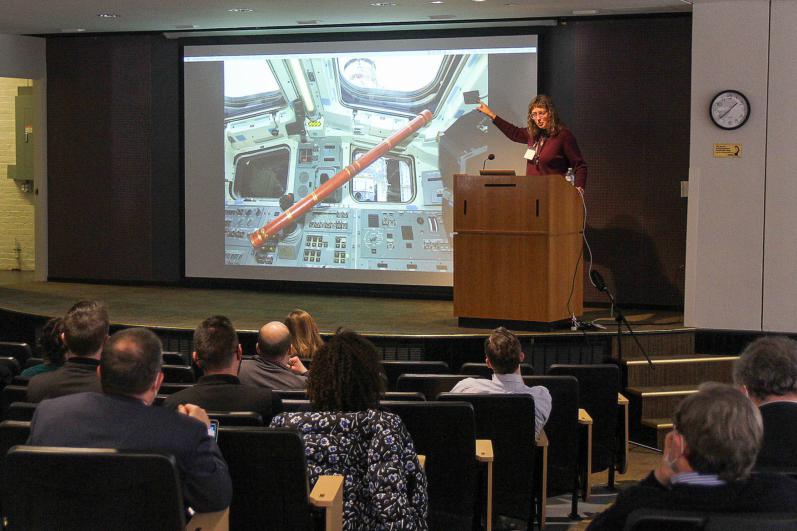Harvard hosts Thomistic Institute conference on science and Christianity
CAMBRIDGE -- The Big Bang, evolution, astronomy, and extraterrestrial life were among the many topics addressed during Harvard University and the Thomistic Institute's conference on "Science and Christianity: Cosmic Origins and Creation." The two-day event took place March 4-5 at the Harvard Museum of Natural History and drew many students from nearby colleges and universities.
The Thomistic Institute is a research institute based at the Dominican House of Studies in Washington, D.C. Its campus chapter program enables Catholic students at secular colleges to host Catholic intellectuals as guest speakers on their campuses. Harvard University and the Massachusetts Institute of Technology are among the 70 schools in the country that have a chapter on their campus.
The scientists who spoke during the conference came from various fields and included professors, authors, and Dominican priests, with varying connections to Harvard or the Thomistic Institute.
Dr. Karin Oberg, an astronomy professor at Harvard who has collaborated on projects with the institute, said they had two motivations for organizing the event. One was to disprove the myth of an inherent conflict between science and religion. The other was to go beyond that, to bring the revelations of science into dialogue with Christian beliefs.
"By doing intellectual work and interface between science and Christianity, there's a lot of things to discover that actually leads to deeper understanding of the kind of universe we inhabit," she said, speaking to The Pilot on the second day of the conference.
Father Dominic Legge, OP, director of the Thomistic Institute, explained how they drew inspiration from St. Thomas Aquinas, their patron saint. Aquinas taught that there is a harmony between faith and reason, and that there cannot be conflict between them, because God is the source of both.
"That's a conviction that animates all the work that we did in preparing for this conference," Father Legge said.
The conference began in the evening of March 4 with introductory remarks from Oberg. There was also a talk from Professor Stephen Barr, president of the Society of Catholic Scientists, on "The Existence and Order of the Universe," followed by a reception.
Most of the lectures took place on March 5, starting after lunch. Father Thomas Davenport, OP, spoke about "Big Bang and the God of Creation." Dr. Jennifer Wiseman, an astronomer and member of the American Association for the Advancement of Science, gave a presentation on "A Magnificent Universe Evolving for Life," including many photographs taken through telescopes as well as artists' renderings of stars and galaxies. Brown University biologist Kenneth Miller gave a talk about "The Human Difference: How Evolution Fashioned the Earth's Most Extraordinary Creature." Cornell University Professor Jonathan Lunine talked about "Searching for Planets, and Life, in the Cosmos," and Oberg delivered the final lecture, on "Christianity and Extraterrestrials." Father Legge then shared concluding remarks as the conference wrapped up.
In addition to being part of the institute's speaker network, Oberg has also been featured regularly in their ongoing YouTube series, Aquinas 101. The first season was about the thought of Aquinas, and the second season is about the relationship between faith and science.
"It really is trying to present a series of carefully thought-through analyses of how to think about science and faith in a way that is accessible to the broad public," Father Legge said.
Oberg said the conference was a "more intimate format" than the video series.
"I'm very happy to have it here, at Harvard, in person, with the students," she said.
One person who attended the conference, and helped with the local logistics of it, was Natasha Toghramadjian, a Harvard PhD student studying geophysics. She is a student member of the Society of Catholic Scientists and has been trying to form a student chapter of the society for Harvard and MIT.
Toghramadjian said that, to her, the conference was "a really wonderful testimony to the harmony of science and faith."
Her own faith influenced her decision to study geophysics, with a particular focus on earthquakes. She said she was "enamored by the beauty, the richness, the mystery of physics," but also felt "the pull to work on something that could change human lives." While scientists cannot predict exactly when an earthquake will happen, they know that earthquakes will happen in certain locations, and can find ways to prepare for them, such as improving the structure of buildings in seismically active areas.
Toghramadjian acknowledged that natural disasters like earthquakes and volcanic eruptions make people wonder about the question of suffering. But, she pointed out, they also form some of the most beautiful parts of the planet, like mountains.
She said that science and theology each, individually, "represent some of the most profound, most rigorous, most generationally cumulative applications of our human faculties."
"At the heart of it, faith and science are so linked in their core because they're both rigorous searches for the truth -- two different perspectives, but very much in harmony in their common mission," Toghramadjian said.
More information about the Thomistic Institute is available at ThomisticInstitute.org. The Aquinas 101 series can be viewed on the institute's YouTube channel or at Aquinas101.thomisticinstitute.org.



















